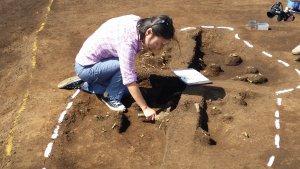Presented By: Nam Center for Korean Studies
CANCELLED - Nam Center Colloquium Series | The Origins of Korean Cuisine: Prehistoric Foodways from Foraging to Farming
Gyoung-Ah Lee, Associate Professor, Department of Anthropology, University of Oregon

Unfortunately and due to unforeseen circumstances, this event has been cancelled.
Archaeology can offer a long-term perspective on foodways well before writing was invented. How food is procured and prepared impacts environments and our own cultural identities today, and this is no difference in prehistoric times. This talk will engage the audience what Dr. Lee and her team have found on food culture of over 8,000 years in Korea. One of the key questions is how prehistoric communities managed various food resources and constructed sustainable niches over the long term before, during, and after farming began. Examples come from diverse landscapes, including hilly sand dunes on the east coast, alluvial flats along the Nam River, coastal inlets of Busan harbor, and Jeju Island. Food culture flourished well before the recipe was written.
Gyoung-Ah Lee is an archaeologist investigating ancient human-environment interactions and cultural niche construction in prehistoric Asia. Her work deals primarily with the long transition from hunting and gathering to dependence on farming for food, and has been featured in media outlets ranging from scientific journals to NPR. She and her research team secured various funding from the Korean Studies Promotion Service, the Henry Luce Foundation, National Geographic, Social Sciences and Humanities Research Council of Canada, and more. While focused in Asia, her research spans the globe, and she has led archaeological projects and participated in excavations in Australia, Canada, China, Indonesia, Korea, and Vietnam. Since 2007 she has been based at the University of Oregon, in Eugene, as a member of the faculty of Anthropology.
If you are a person with a disability who requires an accommodation to attend this event, please reach out to us at least 2 weeks in advance of this event. Please be aware that advance notice is necessary as some accommodations may require more time for the university to arrange.
Archaeology can offer a long-term perspective on foodways well before writing was invented. How food is procured and prepared impacts environments and our own cultural identities today, and this is no difference in prehistoric times. This talk will engage the audience what Dr. Lee and her team have found on food culture of over 8,000 years in Korea. One of the key questions is how prehistoric communities managed various food resources and constructed sustainable niches over the long term before, during, and after farming began. Examples come from diverse landscapes, including hilly sand dunes on the east coast, alluvial flats along the Nam River, coastal inlets of Busan harbor, and Jeju Island. Food culture flourished well before the recipe was written.
Gyoung-Ah Lee is an archaeologist investigating ancient human-environment interactions and cultural niche construction in prehistoric Asia. Her work deals primarily with the long transition from hunting and gathering to dependence on farming for food, and has been featured in media outlets ranging from scientific journals to NPR. She and her research team secured various funding from the Korean Studies Promotion Service, the Henry Luce Foundation, National Geographic, Social Sciences and Humanities Research Council of Canada, and more. While focused in Asia, her research spans the globe, and she has led archaeological projects and participated in excavations in Australia, Canada, China, Indonesia, Korea, and Vietnam. Since 2007 she has been based at the University of Oregon, in Eugene, as a member of the faculty of Anthropology.
If you are a person with a disability who requires an accommodation to attend this event, please reach out to us at least 2 weeks in advance of this event. Please be aware that advance notice is necessary as some accommodations may require more time for the university to arrange.